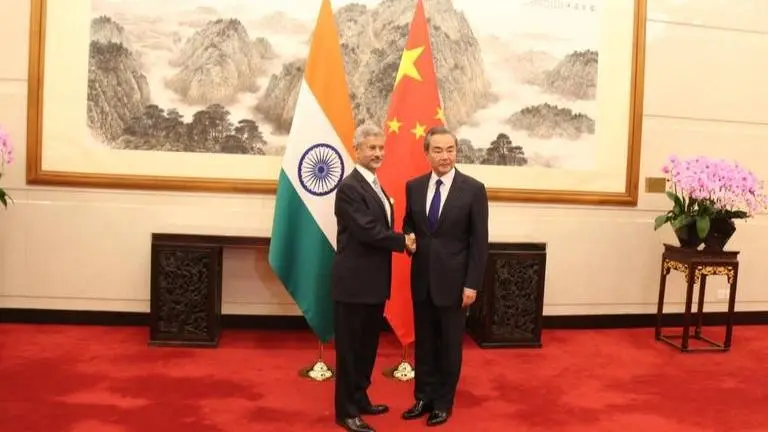Updated 13 August 2019 at 07:37 IST
Decisions on J&K internal matter; Differences should not become disputes: India to China
India's decisions on Jammu and Kashmir are the country's "internal" matter and the sole prerogative of the country which have no implication for either the external boundaries of India or the LAC with China, External Affairs Minister S Jaishankar told his Chinese counterpart Wang Yi on Monday, amidst Beijing's objection to the formation of Ladakh as Union Territory.
- India News
- 5 min read

India's decisions on Jammu and Kashmir are the country's "internal" matter and the sole prerogative of the country which have no implication for either the external boundaries of India or the LAC with China, External Affairs Minister S Jaishankar told his Chinese counterpart Wang Yi on Monday, amidst Beijing's objection to the formation of Ladakh as Union Territory.
During his bilateral meeting with Wang, Jaishankar also said it was important to ensure that bilateral differences should not become disputes and emphasised that the future of the ties will depend on the mutual sensitivity to each other's "core concerns".
The remarks came in response to Wang, who brought up developments pertaining to legislation passed recently by the Indian Parliament on J&K, saying China is "very closely" following the Indo-Pak tensions over Kashmir and its "ramifications" while asking New Delhi to play a "constructive role" for regional peace and stability.
According to an official release from the Ministry of External Affairs, during the bilateral meeting, Jaishankar conveyed that this was an "internal" matter for India and the issue related to changes in a temporary provision of the Constitution of India and was the sole prerogative of the country.
Advertisement
Asserting that the legislative measures were aimed at promoting better governance and socio-economic development, Jaishankar also said there was no implication for either the external boundaries of India or the Line of Actual Control (LAC) with China.
"India was not raising any additional territorial claims. The Chinese concerns in this regard were therefore misplaced. The minister also conveyed that so far as the India China boundary question was concerned, the two sides had agreed to a fair, reasonable and mutually acceptable settlement of the Boundary Question on the basis of the 2005 Political Parameters and Guiding Principles," the release said.
Advertisement
Jaishankar, who is on a crucial three-day visit to China, also called on Chinese Vice President Wang Qishan, considered a confidant of President Xi Jinping.
Welcoming Jaishankar, Foreign Minister Wang referred to the Indo-Pak tensions without directly mentioning about India scrapping the Article 370 of the Constitution that gave special status to Jammu and Kashmir.
"On the basis of the Five Principles of Peaceful Co-existence, we can have mutually beneficial cooperation. This is in the fundamental interest and long term interest of our two peoples and also contribute to world peace and human progress," Wang said.
"At the same time, China and India as two big nations, also have important responsibilities for upholding the regional peace and stability," he said.
"When it comes to the recent tensions between India and Pakistan and the possible ramifications, we follow these developments very closely. We hope that India would also play a constructive role for the regional peace and stability," Wang said.
The visit of Jaishankar, the first Indian minister to tour China after the Modi government began its second term, is taking place following India's decision to revoke the special status of J&K and divide the state into two Union Territories -Jammu and Kashmir, and Ladakh.
His visit was finalised much before India's move to revoke Article 370 of the Constitution that gave special status to J&K.
China on August 6 had objected to the formation of Ladakh as Union Territory by India, saying it undermined its territorial sovereignty, evoking a sharp reaction from New Delhi, which asked Beijing to refrain from commenting on its "internal affairs".
Jaishankar's visit comes days after Pakistan Foreign Minister Shah Mahmood Qureshi travelled to Beijing on August 9 to seek China's support for his country's attempts to take India's move to revoke special status to Kashmir to the UN Security Council.
Jaishankar later told the media that the change is for better governance and social and economic development.
To a question, whether the Chinese side raised the issue of Aksai Chin, Jaishankar said the issue came up when the Chinese side referred to what they perceived to be the impact of Article 370.
"The position I took was we maintain our boundary claims. We maintained our international boundary as per our map," he said, adding that since the Chinese side raised these issues the clarity was provided.
"They conveyed concerns expressed by Pakistan. My point was that they have to look at the reality of the situation. As far as Pakistan is concerned, the reality was sober reality and there was no implication and the matter did not concern Pakistan," he said.
Asked whether the China-Pakistan Economic Corridor, over which India has protested to China as it traversed through Pakistan-occupied Kashmir, Jaishankar said it did not figure in detail.
"There was a discussion on connectivity. I reiterated India's position," he said.
The Bangladesh China India Myanmar (BCIM) corridor which is a part of China's Belt and Road Initiative also figured in the talks.
A joint study group is still working on it, he said, adding that India was not responsible for the delay in the project.
He said issues related to permitting telecom giant Huawei in 5G trials, "came up in passing" reference. "It is a mater on which the government has not taken a decision...we don't have a definitive position on it," he said.
Jaishankar said China has indicted that it is open to expand access to the Kailash Manasarovar Yatra.
Published By : Press Trust Of India
Published On: 13 August 2019 at 07:27 IST
